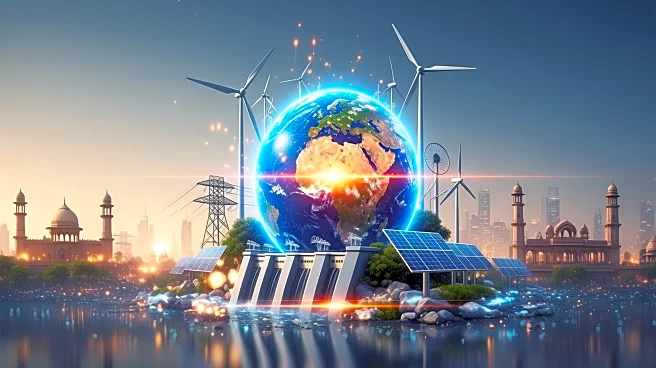What's Happening?
India is actively pursuing a strategy to secure its energy future by diversifying its crude oil imports and increasing domestic exploration. Petroleum Minister Hardeep Singh Puri announced that 99% of India's offshore area has been opened for oil and gas
exploration. The country has expanded its import basket from 27 to over 40 countries, aiming for a secure, affordable, and sustainable energy future. This approach is part of a broader strategy that includes innovation, increased domestic exploration, and a clean transition, highlighted by initiatives like the Green Hydrogen Mission and the Ujjwala scheme for subsidized LPG. The government emphasizes that its import policy is guided by the interests of Indian consumers amid a volatile global energy market.
Why It's Important?
India's energy strategy is crucial for stabilizing global oil prices and ensuring energy security for its population. By diversifying its sources and increasing domestic exploration, India aims to reduce dependency on any single country, particularly in light of geopolitical tensions such as the Russia-Ukraine war. The shift towards cleaner energy sources and technologies also aligns with global sustainability goals. This strategy could lead to more stable energy prices, benefiting consumers and industries reliant on energy. Additionally, India's increased oil purchases from Russia have played a significant role in stabilizing global oil prices, preventing potential spikes.
What's Next?
India's continued diversification and exploration efforts are likely to further stabilize its energy supply and prices. The government may continue to negotiate with other countries to expand its energy procurement, potentially deepening cooperation with the United States. As India progresses with its clean energy initiatives, there may be increased investment in renewable energy technologies and infrastructure. The focus on domestic exploration could lead to new discoveries, further reducing reliance on imports.
Beyond the Headlines
India's energy strategy reflects broader geopolitical dynamics, particularly its balancing act between major global powers like the US and Russia. The emphasis on clean energy transition also highlights India's commitment to global environmental goals, potentially influencing other countries to adopt similar strategies. The Ujjwala scheme's impact on rural households underscores the social dimension of energy policies, improving living standards and health outcomes by reducing reliance on traditional fuels.
















